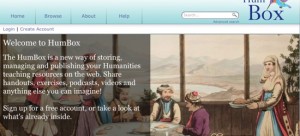Open Educational Resources come of age?
Some time around Christmas I wrote that I was encouraged by the slow but steady progress in embedding Open Educational resources in the policy and practice of educational institutions. The Jisc funded HumBox project is the kind of thing I mean.
According to the project web site ,”The HumBox project focuses on the Humanities and is a collaboration between four Humanities Subject Centres (LLAS, English, History and Philosophical and Religious Studies), and at least twelve different institutions across the country.The HumBox project aims to publish a bank of good quality humanities resources online for free download and sharing, and in doing so, to create a community of Humanities specialists who are willing to share their teaching materials and collaborate with others to peer review and enhance existing resources. The resources published as part of our project will be placed in the HumBox, an innovative new online storage area for teaching and learning materials.”
And, although always somewhat wary of what project web sites claim, the say they already have over 100 individual learning resources published in the repository and a peer review process initiated between the 12 partner institutions.and widely publicised initiatives in Open Educational resources were single institution initiatives with project funding allowing the employment of staff to develop a bank of open resources. However these initiatives, whilst attracting much attention, were problematic in a number of ways. Firstly, they had little traction or impact within the institution and thus limited submissions from institution staff. Secondly there has been limited reuse of resources, or if resources have been reused they are not being submitted back to OER repositories. And third is teh fraught issue of quality. Project staff have neither the time or expertise to review resources themselves and the lack of a community around the project has limited efforts to develop peer review processes.
However the new generation of projects such as HumBox, whilst perhaps not as well known as The Open University Open Learn or the MIT OER initiative, are based within the community of practice and thus have the potential to overcome these issues.
- 1000+ individual learning resources published to the HumBox repository
- Peer review process initiated and ongoing amongst project partners across 12 institutions

